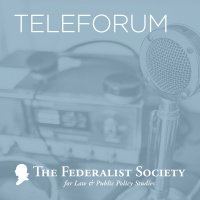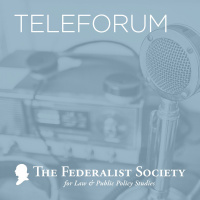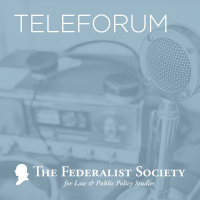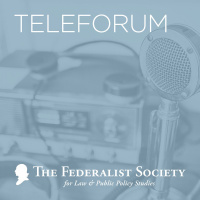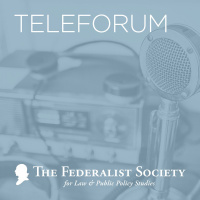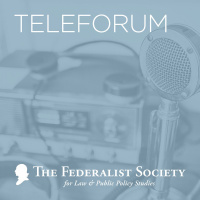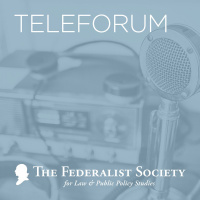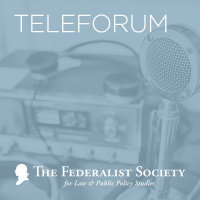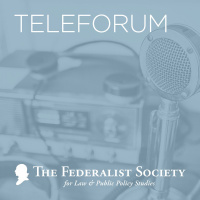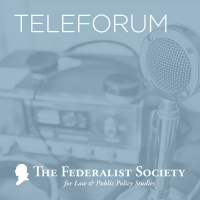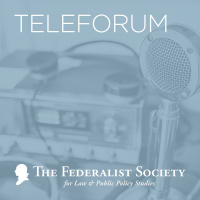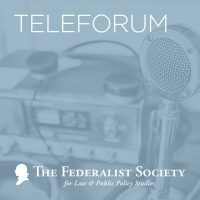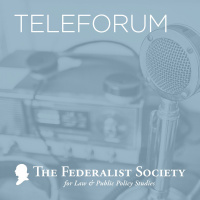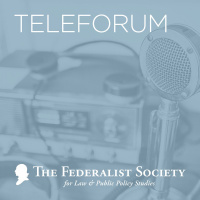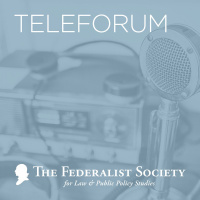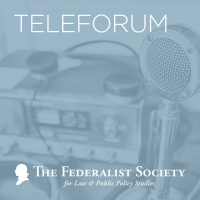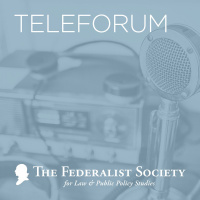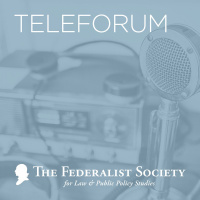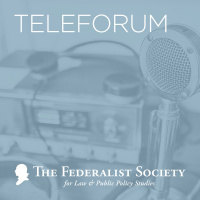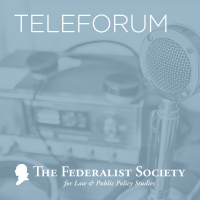Sinopsis
This series of podcasts features experts who analyze the latest developments in the legal and policy world. The podcasts are in the form of monologues, podcast debates or panel discussions and vary in length. The Federalist Society takes no position on particular legal or public policy issues; all expressions of opinion are those of the speakers. We hope these broadcasts, like all of our programming, will serve to stimulate discussion and further exchange regarding important current legal issues.
Episodios
-
Courthouse Steps Decision Teleforum: Shular v. United States
05/03/2020 Duración: 16minIn a 9-0 decision, the Supreme Court decided Shular v. United States, rejecting the defense argument that Florida’s unique drug laws cannot be used to enhance a federal sentence. At issue was a federal statute known as the Armed Career Criminal Act (“ACCA”). ACCA imposes a mandatory 15 year sentence on defendants convicted of federal firearms-related felonies if they have 3 or more prior convictions for “serious drug offenses” or “violent felonies.” In 2017, local law enforcement officers executed a search warrant at the Florida home of Eddie Shular who was the target of a drug trafficking investigation being conducted by the Drug Enforcement Administration (“DEA”). During the search, the officers seized a firearm from a bedroom closet. Because Shular was a convicted felon, he was charged under federal law with the crime of being a felon in possession of firearm (18 USC section 922(g)(1)). He pled guilty to that offense and, because he had more than three prior convictions for serious drug offenses,
-
Litigation Update on New York’s “Rent Stabilization” Law
05/03/2020 Duración: 55minDoes New York’s “rent stabilization” law violate the federal Constitution? The law, which regulates approximately 1 million apartments in New York City, was enacted more than fifty years ago and remains in effect based on an every-three-year declaration of a housing “emergency.” The law does not merely regulate rent levels, it also limits a property owner’s right to determine who uses an apartment, to convert the property to new uses, and to occupy the property for use by the owner and his or her family.A lawsuit filed last year asserts that the New York law—including 2019 amendments that significantly increased the restrictions on property owners—violates due process and effects both physical and regulatory takings of the property that it regulates. New York City, New York State, and tenant advocacy groups have moved to dismiss the action. Rent control is not just a New York phenomenon. Other cities across the country have enacted, or are considering, rent regulation legislation. Andrew Pincus, lead couns
-
Litigation Update: McMahon v. Fenves
04/03/2020 Duración: 38minIn a matter of first impression, the Fifth Circuit Court of Appeals recently issued an opinion in the consolidated case of McMahon v. Fenves, concerning the removal of historic Civil War and World War I monuments to American veterans from the University of Texas at Austin and Travis Park in San Antonio. The Court cited lack of standing that precluded its jurisdiction over the controversy under Lujan v. Defenders of Wildlife. The issue of standing is itself of interest, because the question in this context concerns who has authority to control societal memory. Plaintiff-Appellants initially cited to state law cases from Hawaii, New Mexico, and Maine that provide a public-interest exception to general standing requirements. This exception provides for standing to any member of the affected public in a matter of general public interest. Plaintiffs in the instant case argued that the public interest to protect core political speech should provide standing. Plaintiffs contended that political speech is a gen
-
Courthouse Steps Decision Teleforum: McKinney v. Arizona - And the Future of Capital Sentencing
27/02/2020 Duración: 15minOn Tuesday, in a 5-4 decision in McKinney v. Arizona, the Supreme Court of the United States issued a landmark death penalty and criminal procedure opinion about the division between direct and collateral review and the jury requirements that the Court had previously explicated in the Apprendi line of cases, including Ring v. Arizona and Hurst v. Florida. At issue was an Arizona Supreme Court opinion that conducted an appellate reweighing of aggravation and mitigation after a remand from the En Banc Ninth Circuit for a supposed error in treatment of certain mitigation on direct appeal. Writing for the majority, Justice Kavanaugh clarified or confirmed several important criminal and death penalty procedure issues. First, the majority affirmed the ongoing validity of Clemons v. Mississippi and the availability of appellate reweighing of aggravation and mitigation. Second, the Court confirmed that a jury need only find the existence of an aggravating factor, and need not conduct the weighing of aggravation and
-
-
Update on Public Nuisance Lawsuits
26/02/2020 Duración: 32minIn AEP v. Connecticut (2011), the Supreme Court unanimously rejected federal common law nuisance claims brought by states and cities against companies alleged to have contributed to global warming by emitting greenhouse gases. The Court held that Congress, by enacting the Clean Air Act, had displaced the federal common law of nuisance and gave jurisdiction over these issues to the EPA. The Court declined to open up a “parallel track” to enforcing carbon emissions standards in the federal system via the federal courts. Since that time, states and municipalities in California and elsewhere have brought similar suits under state nuisance law, but judges have indicated this problem needs a national solution that “must be fixed by our [other] political branches.” At present, the First, Second, Fourth, Ninth, and Tenth Circuits are hearing arguments about whether these issues belong in the federal courts, state courts, or elsewhere. Featuring: -- Theodore J. Boutrous Jr., Partner, Gibson, Dunn & Crutcher LLP
-
Modernizing the National Environmental Policy Act (NEPA)
25/02/2020 Duración: 56minOn January 10, the White House Council on Environmental Quality (CEQ) proposed revisions to its regulations for implementing the National Environmental Policy Act (NEPA), signed into law in 1970. CEQ has not comprehensively updated these regulations for forty years. Since its enactment, the NEPA environmental review and permitting process has become increasingly complex and time-consuming and extends far beyond what Congress originally intended. Importantly, NEPA is a procedural statute that requires Federal agencies to assess the environmental impacts of proposed major Federal actions. The purpose of NEPA is essential to sound governments. The chosen means is a “procedural” statute that requires Federal agencies to prepare a detailed statement on environmental impacts from a proposed Federal action, alternatives to the proposed action, unavoidable adverse effects, and any irreversible and irretrievable commitments of resources that would be involved. The average length of an environmental im
-
Courthouse Steps Preview: United States Forest Service v. Cowpasture River Preservation Association
22/02/2020 Duración: 39minOn February 24, 2020 the Supreme Court will hear argument in two consolidated cases, U.S. Forest Service v. Cow Pasture River Assn. and Atlantic Coast Pipeline Assn. v. Cow Pasture River Assn., in which the Fourth Circuit invalidated the permit for construction of a multi-billion-dollar natural gas pipeline that crosses the Appalachian Trail on Forest Service land in Virginia. The issue is which, if any, federal agency can authorize construction that impacts the Trail, which crosses private, state and federal land from Georgia to Maine and operates under a host of statutes, regulations and private agreements. The case is a textbook study in legislative interpretation, congressional intent and private-public cooperative agreements. Our presenters are two of the lawyers who filed amicus briefs for parties directly impacted by the case. Keith Bradley, counsel for the Appalachian Trail Conservancy, is a partner with the Squire Patton Boggs firm in Denver and former counsel with the Department of Energy, where he
-
Courthouse Steps Preview: Seila Law LLC v. Consumer Financial Protection Bureau (CFPB)
18/02/2020 Duración: 32minIn Seila Law LLC v. Consumer Financial Protection Bureau (CFPB), the Supreme Court will decide the constitutionality of the CFPB, an agency long criticized not just by the business community but also constitutional scholars who see major problems a single-director agency seemingly unaccountable to the president or anyone else. The lawsuit was brought by a law firm that assists in resolving personal-debt issues, among other legal work that puts it in the crosshairs of those who want greater regulation of consumer-facing financial services. The CFPB is the most independent of independent agencies, with power to make rules, enforce them, adjudicate violations in its own administrative hearings, and punish wrongdoers. It doesn’t need Congress to approve its budget, because its funding requests are met by another agency insulated from political control: the Federal Reserve. Even CFPB supporters concede that the CFPB structure and authority is unique. Please join John Eastman for a preview of oral arguments in this
-
The New Definition of “WOTUS”: Analysis of the Trump Administration’s “Navigable Waters Protection Rule”
18/02/2020 Duración: 53minThe Trump Administration recently released its final rule defining “waters of the United States” under the Clean Water Act. This rule, called the “Navigable Waters Protection Rule” is the replacement for the repealed 2015 Clean Water Rule. For decades, the Environmental Protection Agency and the U.S. Army Corps of Engineers have struggled to define “waters of the United States” in a way that passes legal muster. Criticism has long-focused on the alleged overreach by the agencies, the vagueness of the definition, and a disrespect for the state role in addressing clean water as envisioned by Congress. However, many critics of the new EPA and Corps’ rule argue that it is too narrow and not properly based on science. Please join us as our experts discuss the history of the “waters of the United States” definition, explain the new rule and what waters would be regulated, and provide their insight and perspective on the impact of this major new rule.Featuring: -- Daren Bakst, Senior Research Fellow in Agricult
-
Litigation Update: FTC v. Qualcomm
17/02/2020 Duración: 39minIn January 2017, the Federal Trade Commission (FTC) filed an antitrust complaint against Qualcomm in the Northern District of California. The FTC alleged that Qualcomm had unlawfully monopolized the market for certain semiconductors important in smartphone technology. Among other things, the FTC claimed that Qualcomm had maintained its market position by requiring chip customers to license their chips separately (known as the “no license, no chips” policy) and had refused to license its standard-essential patents (SEPs) to competitors. Judge Lucy Koh held a bench trial in January 2019 and issued a decision in favor of the FTC in May 2019. In a lengthy opinion, the court determined that Qualcomm’s “no license, no chips” policy violated antitrust law and that Qualcomm had a separate antitrust duty to deal with its competitors. Judge Koh then issued an injunction that, among other things, prohibited Qualcomm from conditioning the supply of chips on a customer’s patent-license status and required Qualcomm to
-
The Whys and Hows of Commenting on Rules
13/02/2020 Duración: 40minPublic notice and comment on rulemaking is a core requirement of the Administrative Procedure Act, and creates the administrative record on which any subsequent judicial review will be based. Yet many people (even people who take the trouble to vote) seem to think that commenting on rules is difficult or futile, and therefore don’t participate – even when they care about the outcome. This Teleforum will discuss the practical mechanics of tracking the development of rules and filing timely comments; in fact, timely filing is about the only legal requirement for getting comments onto the record. It will describe the sorts of comments that tend to be effective in persuading an agency, including comments made directly by affected small entities without professional representation. It will also explain the concept of a “Public Interest Comment” which argues, not on behalf of any particular party or cause (however worthy), but in favor of a balanced resolution of the conflicting considerations that an agency mu
-
Fitzpatrick v. Frank: Should Conservatives Embrace Class Actions?
08/02/2020 Duración: 01h05minProfessor Brian Fitzpatrick of Vanderbilt Law School and Ted Frank of the Center for Class Action Fairness debate Professor Fitzpatrick’s provocative new book, The Conservative Case for Class Actions (University of Chicago Press).
-
Litigation Update: The Government, Apple, and the Encryption Debate
08/02/2020 Duración: 34minIn 2016 the United States Department of Justice and Apple twice went to federal court over whether Apple could be required to assist the government in unlocking cell phones used by persons under investigation for criminal conduct. One case involved access to an iPhone used by one of the persons responsible for the mass shootings in San Bernardino, California. Another case involved an iPhone seized from a narcotics trafficking suspect in Brooklyn, New York. In both cases, however, the litigations were terminated as moot without final resolution when the government was able to access the iPhones in question without Apple’s assistance. Once again, however, the government and Apple are at odds — this time over access to iPhones used by a Saudi military trainee who in 2019 killed three sailors at a Navy base in Pensacola, Florida. What is the basis for compelling a third party to assist the government in its criminal investigations in accessing encrypted communications using its platforms? What are the key l
-
Litigation Update: City of Boise v. Martin
07/02/2020 Duración: 45minLast month, the Supreme Court denied certiorari in City of Boise v. Martin, a case out of the U.S. Court of Appeals for the Ninth Circuit. The case involved a challenge to Boise’s enforcement of its criminal law prohibiting public camping against the homeless. The Ninth Circuit held that the Eighth Amendment’s prohibition on cruel and unusual punishment prohibits the enforcement of the law against the homeless when there are insufficient beds available in shelters. Although the Court denied review, the Ninth Circuit’s decision raises many important questions about many issues, including the effect on the homeless and surrounding communities, ways that law enforcement might react to their inability to enforce this law, and the potential constraints placed on the approximately 1600 municipalities in the Ninth Circuit—in particular San Francisco and Los Angeles, which have significant homeless populations—in their efforts to combat homelessness and the ills associated with it. Learn about this case's history,
-
Removal or Acquittal? President Trump's Trial in the Senate
05/02/2020 Duración: 59minIn December 2019, the United States House of Representatives voted to impeach President Donald Trump. This is the third impeachment of a sitting U.S. President after Johnson and Clinton. John Malcolm and John Yoo discuss the ongoing Senate trial, the debate over witnesses, comparisons to previous Senate trials, and more. Featuring: -- John G. Malcolm, Vice President, Institute for Constitutional Government, Director of the Meese Center for Legal & Judicial Studies and Senior Legal Fellow, The Heritage Foundation-- Prof. John C. Yoo, Emanuel S. Heller Professor of Law, University of California at Berkeley School of Law
-
Litigation Update: Rodgers v. Bryant
29/01/2020 Duración: 29minIn Rodgers v. Bryant, the 8th Circuit Court of Appeals upheld a statewide injunction of an anti-loitering statute. A notable dissent traced equitable jurisdiction from common-law England through to the current day, concluding that broad universal injunctions are only available in representative lawsuits like class actions and when relief for the plaintiff necessarily requires providing relief to others (as with public nuisances). Professor Samuel Bray, a leading scholar on remedies, described it as “the most detailed and learned decision yet on the history of equity and the scope of injunctions (on either side of this debate that has been running since 2016). The dissenting opinion should be required reading for anyone interested in national or universal injunctions." Anthony Sanders, Director of the Institute for Justice’s Center for Judicial Engagement, joins us to discuss the case, the decision, and its implications.Featuring, -- Anthony Sanders, Director, Center for Judicial Engagement, Institute for Just
-
Amazon’s Case Against President Trump: Did DoD Unfairly give Microsoft the Right to be the JEDI Master?
24/01/2020 Duración: 49minAmazon Web Services, Inc. (Amazon) has claimed in a lawsuit in the United States Court of Federal Claims that unlawful intervention by President Donald Trump deprived it of a $10 billion decade-long contract with the Department of Defense (DoD) for a cloud computing system known as the Joint Enterprise Defense Infrastucture (JEDI). Long considered the favorite, Amazon nevertheless lost the award to Microsoft Corp. in a competitive bidding process that Amazon claims was arbitrary and capricious and tainted by President Trump’s open feud with Amazon company founder Jeffrey Bezos.Dan Kelly, Alexander Major and Franklin Turner, nationally recognized commentators and practitioners in the federal bid protest arena, will unpack what we know about Amazon’s case, and discuss the possible grounds, laws and regulations governing mandates for competitive contracting by federal agencies.Featuring: -- Alexander Major, Partner and Co-Leader of Government Contracts & Export Controls Practice Group, McCarter & Englis
-
Courthouse Steps Oral Argument Teleforum: Espinoza v. Montana Department of Revenue
24/01/2020 Duración: 31minThis teleforum addresses the January 22 Supreme Court argument in Espinoza v. Montana Department of Revenue. The question in this case is whether it violates the Free Exercise Clause for a state supreme court to invalidate a school choice program, merely because that program includes religious options, pursuant to that state’s Blaine Amendment. The Institute for Justice represents the Plaintiffs in the case.Featuring: -- Erica Smith, Senior Attorney, Institute for Justice
-
Courthouse Steps Oral Argument: Wire and Federal Program Fraud: A ‘Bridgegate’ Too Far?
15/01/2020 Duración: 20minBridget Anne Kelly and William Baroni were convicted of wire fraud, federal program fraud and conspiracy for orchestrating lane closures on the George Washington Bridge in September, 2013, as an elaborate punishment to the mayor of Fort Lee, New Jersey for refusing to endorse Governor Chris Christie for re-election. In Bridget Anne Kelly v. United States, the latest in a series of political corruption cases to reach the Supreme Court, the justices will consider whether these acts can amount to defrauding the government. Steve Klein, a partner at Barr & Klein PLLC and a member of the Free Speech & Election Law Executive Committee, will discuss the implications of the case and give his thoughts on oral argument. Featuring:Mr. Steve Klein, Partner, Barr & Klein PLLC Teleforum calls are open to all dues paying members of the Federalist Society. To become a member, sign up on our website. As a member, you should receive email announcements of upcoming Teleforum calls which contain the conference call p

